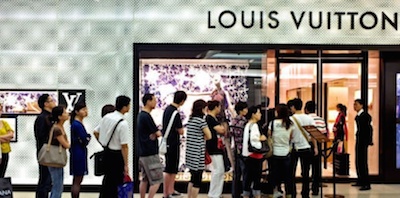Consumer confidence in Mainland China is showing signs of growth, while Hong Kong consumers are expected to be more conservative in their luxury spending, according to a new report by Ruder Finn and the Consumer Search Group.
Forty-two percent of Mainland consumers expect to raise their luxury spending in 2016, but just 25 percent of Hong Kong residents say the same, whereas 30 percent said they would be spending more in 2015. However, while Hong Kong consumers may be curbing their spending, they are still interested in exploring new luxury brands and services, and the luxury industry should not discount the city.
"While demand for luxury remains strong in Mainland China, Hong Kong luxury consumers are showing lesser intent in luxury purchase," said Simon Tye, executive director of CSG Hong Kong.
"Hong Kong customers are still interested in discovering new luxury brands and experiences," he said. "They are very discerning customers who know and appreciate good quality products."
The 2016 China Luxury Forecast is based on a survey of 1,040 consumers from Mainland China and 301 from Hong Kong. Average annual household income on the mainland was 833,509 renminbi, or $128,850 at current exchange rates, and for Hong Kong respondents was 957,006 Hong Kong dollars, or $123,414.
Travel plans
Travel is still the number one category that Chinese consumers spend on, whether they are on the Mainland or in Hong Kong.
Half of Mainland residents said they planned to spend more on travel in 2015, and this year the figure rose to 53 percent, showing a growing investment in travel. Comparatively, in Hong Kong, consumers are showing 5 percent less interest in purchasing vacations than they did in 2015.
Chinese consumers take four trips within the country and three trips abroad per year, picking Hong Kong, France and Japan most often. Hong Kongers venture outside of the city 3.7 times in a year and favor trips to Japan, Taiwan and Mainland China.

Picture posted on Weibo by Chinese tourists with Paris' Eiffel Tower in the background
When deciding where to book, 63 percent of Mainland Chinese individuals value culture and history, while half of Hong Kong consumers prioritize convenience of transportation. For both, the second most important aspect desired in a locale was shopping options.
All respondents say their favorite activity when abroad is spa and wellness, followed by dining.
When traveling internationally, those surveyed show a desire for familiarity, with 43 percent of Mainland Chinese consumers noting that Chinese-speaking staff are a necessity. In comparison, only a quarter of Hong Kong residents say the same.
A sense of cultural familiarity is also appealing to Chinese consumers as they are selecting merchandise or services. While only 11 percent of Hong Kong consumers say that Chinese elements are extremely or very important in a purchase, 58 percent of Mainland shoppers said they value it highly.
The differences do not end there, as Hong Kong clients appreciate elements of Chinese culture the most, while symbols of good luck rank highest in favor for their Mainland counterparts.
Online operations
For luxury brands, maintaining an online presence in China is an important step in reaching consumers there. A brand’s Web site is the preferred platform for research.
Chinese consumers are becoming more comfortable buying online. Across China, shoppers now visit stores an average of two times to view products in-person before making a purchase. This is down from last year, when Mainland clients made 2.3 visits and Hong Kong consumers 2.6.
Online channels may also play a key role in generating sales as consumers are traveling. Before they have left, 57 percent of Mainland travelers and 46 percent of Hong Kong residents have already planned all of their purchases. While they may not know specific products, they have chosen what brands they want to shop with.

Chinese consumers outside a Louis Vuitton store
A number of luxury brands have launched ecommerce sites in China within the past year, but online shopping still feels like risky business to many of the country’s consumers, according to a new report by FDKG.
FDKG’s “Luxury Insights China 4th Quarter” report explains that with less regulation of online sales in China, consumers may have to endure a drawn out dispute if items are not delivered as promised, making each purchase a consideration of not only spending budget, but a weighing of how much can comfortably be lost. While some may still opt for an in-store purchase, a growing interest in online shopping within China is evident in the $14 billion in transactions during Single’s Day Nov. 11 (see story).
In the long-term, research has shown a positive outlook for Chinese spending.
Even with a faltering economy, Chinese consumption is projected to rise $2.3 trillion by 2020, according to new research by Boston Consulting Group and AliResearch Institute.
Households with disposable incomes of $24,000 or more will drive 81 percent of consumption growth through 2020, creating demand for high-end goods and services. With rising incomes, a younger generation gaining spending power and growing ecommerce expenditures, brands will need to adjust their strategies (see story).
"Consumers are again focusing on the experiential this year, with travel and beauty showing the most significant growth," said Gao Ming, senior vice president, general manager luxury practice China, Ruder Finn Asia. "With increasing foreign travel comes increasing foreign purchases, made by a demographic with clear motivations and strategies when it comes to their luxury lifestyle.
"It's also clear that optimizing the online customer experience remains more crucial to success than ever."
{"ct":"CyDkY1y+jVO60r3dHSTUQk42i9N8nRkhgbHeVJWwyPIjQzkTa8pFJq7PuWpPsoKW21+OXpDvQKoLXkm09s3Y92SaH3PnMfHlRZ+unNp2oOgSVzibsynV0\/fsYQXSZXXXx8vTERtOl+K3Yt\/+264pB1u20OO3zRtWlbu\/fm3x4p2cYdGLpy599D73EBih7c7TZralN+emryDPSYgbYFy\/e\/+cLxAgy0Zep8RqU8VfYKH95Cq964vyrT18cplB2Ff4d51BqD2XSo9lTBZA381uWVsYQcSF5olkr\/SBYZ2+RIiVNVArnXWxxqu00pk\/gFygOyjxjndQ+0C4VMgXWTWrJDm4mR8oxGI7ps6p61aHCuQMkLB1GQzuE4IVuqD\/7gRqf98GrPkT3uBVxBSfgCtHTrskEAhf\/QBE8CjxYkAquL0iTFjOYtCFbg5qwGiGBQyfTvvnnIdq9JUoVhg3QsQggaHSXkxUdDkHQXgeGsbOstjPTDBYBCK6YxdxtTcMZegzfajkTdjDFnmGgl3fYNFIOzeKm5qiOU8Un4p1R8PXw3oduQH3E7vwLV6w3g79stsAVFciz+0xg4wXJE62Rm5YEbMgtQDOAGRpwr1tca8sgjwae6sGsDMLc\/36LumoRhHchZ3qaeES6T6sPDt4zZghqRnfn0YgHrsONMarhGLUyPj7XBgSwa9RKeuvA0vJh9JLm2eA9P93VHsuf6pGvVV3fVBqpnOiSVzYwBxVi9\/FpBpSm9fNOHWWlTfZL0tHfbMH2Gm\/1AO+03sORl9PDzruRgdj0jbPwVoEzqdhpc6VxYkTdWJ8HW7PKoZG\/ctdcI7rDVwlt6szJoK6IfBmYJau0KL52MuRJv5wNy2VVmjwQCsZDJivBvEEQ4sQgkdIgNwJaG2MLa62AM3A4PNKuRjncP0oPvR8t502JZwF\/0oRiH\/f+TfiRWDqhABCkjE6zPWobInxt2pnFUebEDvwWoY1LvdslPq7DF1tJg0Vo3S+iACaw1pKo5wOQ6D85LLOmWyPPzYpW9PhUCdbRjSKyWCSYywwUCGte+zpPLjdSEeNA34Ixxubrv5b21ZOSXTjYB\/EGfIPurxWw4eWAye8obaQPFetQXjrq5jshPUMvevN7Lm7Gi7kR6oMZFYEAQsdKt3fQMTNj7sh+O8lKa3FB7LmAX3CHz\/wLLEAMQLfunRf3AiTg7GIS9veRixckPfGa8rYAVbkNlUvq93yUk8lWYuOpmzj+zCh2nUvsZLA5nZn8z2eugG6tSMX6XQtAHXL8DHNmk1p7yytyhZnWWgn8uWkdXBAmCGyGBH9V7+6w4YkntEHQvr9Nb4yTddjli9J6tLBXQPgW8qpv7ZUaV0P1VuHZ6Cjn5jsIZOSWrrBxwS28Ohm+PUqkABZOh0ysJu5o3E1heAwV3ZGq89oK1PuYWT4vqoA6hZK2jS3TQVf3JsuueIK5SbkfyJ2NAEuA0O+nWzN7xCHg4OPNzgCmF46vkKgLDsYPDUh1efqubOMdK284w56Rg0+DCxN2\/qZs3JuwP945y0CpAFllW+Hu4LGD1xGLHeks7x8esjunOiXq1fWn4lNj2NbY4ATuXxaH4FdBI4iLXnNmOO0es61rKIHb0kRE4K+W2ROcVE6ynyjzlRTY9uYUcJXNoq1ApjhY+cHniDSf3W9\/VXLsh3teL62RGKt8h2hLblV0u2VfXdU8va6ci5jKquGzV0F3QfhKSjxKKjalLpSkVBo1FyOCLblFTCFWLkzkycnsOPtFdJqXv7ePFujhRjtckqxJhmOJvxJs2p2rvSMPxv0oU9ParhCdFPjeZJyRkmA1Ect7mODbqxmGLWaTHlVmkHl4ngM7kyDC3o48Xq4RRu9ToPoOmrvl74lC4\/xO04YlUrqq\/W7jgnTj4umH\/cD2wWRAAkwayLK1EMT0NjUBZrHrqopS66Rmg579X1CxvIBU\/VGW2FQ8KWxm7b+zSAbUGrxdQcAnbQ4E08S0nTLzjbLB1w2XcFW8pfU+ByYMsCYxeYc3nOG2j59Ds8lrZHCyN1KysfY08Y+KiPFcLqlZ9U4koAw0TOUnKzV36M1cg\/4yZ9EINbWx57XWFWLjkQXXY8Y+XdnenYivZ1vihVeXKwa72h4nQuL9W9Y4Utfx6hyr9demneEYqvgYSftC9xHinkQL2GJxKcCrIjN7nINvsH5tmgZLjMEhwty2O0EeNUeNYjhyQI9o6mCs35HiAtGxF\/7tKZ8QrTB9O\/rKqn4CyaDN3zGuH4Jr\/lZQOoyR2FQYTOyNrN3KwOTBnvdV03fbOgcMDLkG4e73Hgfy8QfOhBWRrd5SJBAfVLH7Ou+69ZKBZXJ9eWS+hKkT4uP54fkjHMbI5wBbpjgA+jW\/iSlPXSR9ZsfylVPRIY7e+JhK40GTLridzM\/bqJo0inS\/nN7PtbVra+8sSw+b+efnD+zAqzkiK0lhm1NDtHcUw\/6IobetUrXwfv7uJ4m91P\/q2XF\/IZhQe5C+tfuC6\/osA6W3lHCwYCaze8OKZoNd\/YkuLMfi7R3tYCQZYOuJt36tHafbNkJGBgdb+\/3cviV2y+DtQ\/Zv0PpYWbOJWFiO8IPbZqfPB6FRwT7GJMGvgXJxQjZmKxhDfVBau2sMwDzBLBcSNO+BUzgU+sy510nTDEqKGzzS18JsBOxHLkkgtqBgs+ZhZAonOQc1XmQwDB0lRMztVI6vGp9h76ekhEss\/v6NGT+xNkeNRkFh1DyYjwlzf45CZfSZcduwmfnLcK5hMkU99u4CMGl6Ac8F5xvBE5dqbTQWNu5Al6bR6fs7ms7\/1eka1oDlLo\/qaHuZzHDrNxVqTn11WEkX7\/T78NoJWPeb1I4E5twEX03SGp4rjm95W4uqkKUvCJi\/\/bKvV\/SRxxcpFxJnUyLfsiSvqFENrlrqBn7pPjJR5KqcFfJ+fAAaeHnLjTx6LM5BqQbWibqOhQlLIxDl3LiIZxF2CT1\/PSGjV9VJolN4shhJ3oy9rwEvcdUUmDNYroGxQwgGc57MYubggTUaxqT5JhME2lClmyHXx9ZhqTpoF5TRWhTQbLgs2gUvDVzMUYc6yzmOt6KYM34I0QGpswe6Oue0GvmeGE5OjTP3H8A7NXDE+0CvrwaAzy4+LLCk4mqlZDGLIONe1ONyP1whsbZ6hZmXjFPJG+OglCAsjIT7c4m1uWtRVKAD\/2beIy4X6csIV71qELti+0J4LD3M2cGH2Xtiz2lIOM1oVeNwrYRRGB8gcf9vn5efm+tTFQYSsvLSBUtWB5urdAludOEWwil3LLtm1yOqP0n7ErbVvns012ZfscxMnkA0wNCCd9doLzUnNCgHp+xTp5\/qs0FNLoE1PtDVYU1WT5zoudkM\/Twj71erzykbEXMh5EWLQZCq6yLAtaMURXSLoWTyrbuv5lYjhWtGP\/VOX\/FQgAonFB+J400Bz2KDbt9wUVxHRk96\/dpNy2CHQQWAlMj53Dj0u4LiLx1igUs\/ne2+KviOyTi0mMEfKoOPDA0F7HcEOmEr\/cVMBKZAuRnGTNk\/Io\/2E3QVk1lo2dcbb+\/q0uTKDuT2pEEGwZ2eR1lKiLjw4w4G4r2uaXQR5gQD4sNvx8WbP\/fEyZlYdih0Dr4bc6tSeIOKZCx2+axUtjPYbd\/SjnL7nkOMwFXIofb+N9CgWggidiHG5H0olJiUzXTFrfwJRergykfbXFkdzNsMki4TSwRgVPRVcEbsPeMu7XchvjZ6F7xpFkUBgNbQXgi4qTIIjkZotX7qnrjgYCUFyOIHWnbEcBYLxT41OHgldyDuUhrEu0zFg5HkMsA9mngZvRzu705vnJrJHMRJJxF70LK6XhPSLZ1w76tUGKEsIn5TInnL8a6Fn9E1YD1RaWZnwHkXZYDEujtRy71vSPXBMPv++W81I6Dc1IG\/3t60h4j1FTIz1catWYPw\/3+jrCbJPimE2pjt3e5h74LXgHXtbNG+pBGsZdOKgyNQnxrbslMWmz27MZ0Y6FP4FUkMDqLI5LhYD1yWFVrEecQcD6FQ6MYa7UIRnMRxfjwjkqvYCAppphwJVJJg6Y\/JtyroQsfiPKdNhk6rcKUa8etVkyrsonRGqajfZzVd6du\/MiahYa+osle\/sk6Rr+d0ME1Nzv6iMLJK7mKwtHB4ZXDkCgYnaEddCs0W6YLTl\/T2DSzo77GLZomhesmsaavYNi8JU\/7XiRJj+3kBw5FLBBpvHPQ7HKXTP3dD+XSjtxXfeQnphkR+BQkCzNB03YK4fz2EYsIyi\/3cxmyGPoUOgZB+MyU8ibmmkZnxXm2JiY8s9J4xEQ7UZKNdAl5ZdSYmfLBTyNVdo45bfG9vNa4DD7peG+oMVgYhYb8+GAqjil2k9tcIFrE5dQ\/613AWRaO2qhds\/LOv0lpbGA5wGeVglJPIcRF3ADKD9GHCJswNtCo2HKHQc1UQ56Gg3eE+tFWs0xzxb9d8MpkjT4fhJHOfSTYdU767\/a61hoDN4aCpPzovaJXiWVtHL+iHbfAwmi9KfTsQc\/RUfmSK3W9nNffNEdpaYueUynKVq++QoGZcaZR5HIUzljCA6ONz5GpqwQfQDYd7gPv7zRagRadUmTn2dZGM6+M4gTy7phj4Wq\/q93MFGXXYvXFqBfzqg16hv2cnQwvZK18t5OF9k+Gco83kab79HKcLJjOMimzLOZOK1y1svI8CVZjaJkVGXcNHm62Sn0QkEbitX\/J+BztL73Dyqn9oXwYO\/qTFgSQB\/fGIEkT\/KMRWvh31LWRm2MZ5Iogs4hqA7xb3RuYeGeVG8U1FYt\/9aE5B2jLqScuQnTehtNgIffWR2EuxhZ\/GVpX0zA88uM6SM\/+k0LqRXfP\/cw1WsLUBiKokNZYtCgZenTqO8TCaX7lCwEhzV4XwhkyQoeNIVTd11q8rn7XOe7DbfW4mmyk656v2t5TOdb6aQAXurqUdf8OTMOFneBAu9e0IHNLLpkMr4LACvhuLjmhNTUnZ\/zroxNo\/UXqVECHtuVNZp6HeS8GT9BD\/pcLucNdOqLBdM7z2yIy14J6Uc7sWeidtv2YVcsNjUbgQVS3he7OOB10dSVXdshamHSB9PAekLAEmtYq1sLjmQeNrSPZe\/J5+P6nnfbYiMBJaxPSD6NsoE4a8mhaRkOuNvJjwwuTRFCkX6SWBF9Jcc\/m7iqotl95IKyEtrybymR5pkt8FNKjAAHt9b8Z+HyQb\/nfsAn6qXXAblB1FX5y11NRrJuX4tIS+5J01Vmx9nVFQZ1PZaObdYKISyq7UTUUXShVWI\/CPTL7sNZCNpj13ZZzd3wXyJMSbUnPUTsdB3NV1e\/6\/K6cfDtprnbsbz1BoPV3z1sQs+esiylj3ld462lhprSTDnRJza7uZ4HsEveTl5O2NWJHEjFvp1x9YXL1aZ4TTp7UDi0WzLG9+evbJyQz7xU9w2Y2+l\/JMxZRtgwkQi8GMvVyI3xwniVVOg1fbHIXodPcCRB+iQov4PrIuMpTrJNvuAEZHcU3E6xl4ghoRIEQrico\/iEu3aOP4lhOpjnqV0ANak6Hx14FM4dic1lebURrmRYAWtGKvgouedDo6khD2QV+qESCRk6ZFbCuXsG4uxY8sP2bYb4ZWBoqho3kQu3Q1Ts2AG3zbW20ppGW76Z7DBmAtDQgXF\/TwcdA9d+JOTrS4ECyYD2oLBqcQc4S4kEpHPowA9mCVL9W4pn12TsGyMganGdSkPBjhpcA4X6PFVkjTOGO6q6RS\/rqMDv2Q\/dBZFV4\/nEW2gZZ8rgmmOLjEsc3NfSiP2dA1KdjpqcZ7rVpNkvP3Fpx1wfRZjF2chmx\/1dqNR\/Wh\/HZMM7WVh3A+QI+6KYkNFX5rHOwXHthrchVcOTk7umKAE0dwdimBV0ngtm\/74tX1yHbPi5W9whSZmKVP9YCmFVMEafg92n9f0826H9okQqqzSSw6pdI1htfiqnffZECLe6VknnXU5uW\/4wp7lWmRCtdpk3LbY3dA7UzvSv0fT2Pq213C3T8WAwaF2SxoSp4kE5KxOS4ew62E6tVbPV1xmmzV+q6A3JPxpZgeZkQJvCsFYUgD1IgN\/lR4wwEijDRrX4RoMc7XTrStAKaxSMRsL7SO4PLkGhP8MmLycHeLzxnva42ZKbOtzhto6c7qV+X738TsntiIoJtmfIVR8hAdUxB0WqsFmz3n4Kia6d0scZF5VjR+bQa9IMkk1SFUQ6UiUeRnCx0jrUTsadzD5ACNL7bWwRTb4SE02oBF6yMBQM3X+wHc2prVZQgACiwgzipz+MNg3puEVB17TZuG3hht9Ejd3SqoFFc78PR6\/6c2y9Z\/TCmCYVRrrogbVDeAyt8FN\/nICJvzIgaZZmSdI10LN03YimBoSxxrh\/QAo8EQ23hAG25t0oAD9Ip7N8JjnEXZ0wpvkvXul2aWTQ5TeAoRuWFGwQGB4UhE2bb3rsBDzzebgMeFRR2YJnL7uzbSuidZS805esHSFd11aTNz5lurFt9+YcSv5AsmorVOhUqSAxVXY7W3oD+gsGOmk+z\/UliJL\/9NgSe3noY18W\/URS09ibD7VyZ8wz4SZj2yLFCOpwGCAL7x0Tgkiv6eoxI7doi5ZQliuxad7IsDdYB3Bk2Tis1K3kl5ZTxq1khHx00SlIRIgXh9YNLjAZPDpEsQ1FKGv\/io9H564JlB3imvDKWPJBhOPu5ieN37l+QrQB6H9bOoPqmnSR3di6pa4FqyZZD0WLyRy5\/Wn4oU9pkm0iQQSBUq40jUQpqufHSHVeFEsJcI3YFRNzGwU+z6jpJBrYjNeIqWQzYvjeoOfOAM3OHEu0BKU5XSwQr5QF5PZZaszT5\/ojtxpvMywefhl9KQ66\/P9LAXKBzGTYjcG9Lg400Bbe2xZjHgydIJ8jJvK2vfv\/XKE5rHA75g336ecryYf5JrfD4iU2BBjLg+OeW7jNvBgBedL\/2yEhZJ3kxSh7zMLgnWVmQ+wr+Gr9dWPfBTijh1JOklq9uDt2R5KdfYcCitggSemXSEEdH\/3q6qTGQa8UFhldqt1mKv+\/UEWhHdVLwsVs79GWE3i243VAIb+0M+7NSzxZbbE3AjEVxiehvMZJsXRvzrBjB3mMxvwUG0t39rIiA5TVnWX4+BjRl6GJlnjqo+ZgRIQOr05Akhy97+ATpNoGlR8iYtteE6oCMh0YQAMdLVPdpmGkzHPy+Bcsql4TEIso2pYjSb6YiURVk6CkjBxfkg9DN5so5eO49LbV\/2K0NLPu30\/lf3pAZxSASr3Gu40rVaAw\/Rlu5IMD9F1bnPif1geEFPb9nsiCY5ndwWupM2MAvZWcX1VwXznG8xkoUrNv3b6eJyx4pPyLnuu+XL7Tg0\/H6Ftt4\/CBGGWSkDjkGqdHKmJzF3P\/Tosz\/2a45DqMXKyUTpMz3SB7ni2ytTvl1bS8S5wAT45VMijobEXlkGrRTQQEbvLV1mh7c+gu8K8m8q7bOY8BpiK8kGTDA08OBIWMokuy\/+fZKFtP7cWLLmZaRZra48WYwbUeIKADXZqFRqImiwohUT9THGArR94hs1aJtEUQFSB0S05L\/xjyMr2RxrqBzZ17IFVe7rWq+KcMdZGpKSMDAm9bgFr6aPWrd44iBBdvXZ2vEkouyoresaPExvf6D5XbhSrAfmBVYMCf02cYTAGpR+9ot94JH\/VZnYCqf9WKWITPDsm1G5LKDUuuHGdVmD78XxCeoe1Hp18OhUwS+xMooroR6J7F73afh1KrTyNstkwhONr82VoZ+UM0RswQ8FGxOifOZ1afJcgR+aQkJw\/ILyzKK8MmXAuLF0NIpwo3WHMc4udroPCWnz389TbMjCQn+l7maX1BnBhApfloStPhNJ9CDJABy1x2tiGsmfGQJ0MZLtD3qK9PqT9qu\/0FwoqZH\/PmLcF3AAhgk7HD1XYobYoX8TiTPbVxnD1YDVWelpyEHtLzgAsm4QQiBvEPj4E\/ivIIo\/PEyDdHHj6FaAico08iPdIL1rXkB3srYkf89FEwOxuCQKDx2zgFU\/fnoiumEQA5MVAhyu0AzT+cka+UGTmF7txITKX0p\/EljaJbB2MxNAB06SKbco+LEY5NC3OKUOHNDIoIVs+8T94uhXNQdNYDn0uVims9h8n9rcT7SRCyyUENF\/PCsabQh9PVY+JASxG3RXM\/15zecXv6AnUPwlgdW1jOby5eH\/1z3qhpPyIfQJMplJyslE5qnzrBnQKGLyTEtNH9cmR2I3pVFQ+SmCTW6xzxqtgWBpX4Rl6QIAU69cw6Iy8pe0ZuGeo0aCY5a3svJdXvSrK10g578+H242Da3AgVW69633+cwPyGWjAtNgRtdYRedZynckE3e+2vBNa\/AR9FTrHPFIgJIUNDHbnDmFuQLZwXKCac4KpyIJsJnXeNaMd3omUYJoMYFmvuPSdKOu\/I89yH8JWYcLA2BLVLvvuZf5JbDkQg8yf39mMHDQpry8NUT0eLa9\/n7mBXI8FWOLbBZFX2FUZbJdlPdHuChuWA\/O0Y8pG7\/RRty4EePSzbJ7RuxX9u9KlHKKiiSE8VYvRR2G7KIq3m4WmTWtvH9K+Kqc9ZIawNqzpeYAqMbZwq5A7zGH7286hKDGeeKPPwgDzsPVMBoa4Jokevg1046cU6GDZ5I89zMEFie3hLDn7c1vTpCjz0\/n0XnVs1CIcb6smG37I93OyQ8BJceoRJVBPn4EIWit4NHCHKhw7SdD8hMgw6251K8R\/koZAv+1pjpNMiqnJ\/EcA6UeQlTu0pI7jzj78b45mYEb1Je\/f4MBiIk341ckAbbmOR4Z\/6zqszTTzyhuPALlcBh1QIK3fYY\/1W2O5U1GtYeaaJ\/bwK8Z+wxuQbF4wxmlryH0U8TwkXUK2s6vO2401asCR9MAKGghdC6iKSAFQuK6EB0hFwFXWEWCE7PjGbDXvtcP4OuXNjpd\/MC46NN2kXk9q1qjNNwkk0ZCwuI1yzH2xayO4ieHwugd6wA12gKSlRC5SA+kwADbjaO5PrROPJfz8qcZUE\/RMZrMLMin0kb1EAMtXEdS\/JZxGACIlDRoArs30LH696LBeKb2VCiIYCMOd9999iKZ2iShPwjm7qGdoT\/o0lKrhlAgGst+GssntEuDPLasNiFW07G\/ggY9ZXG4guJnTVqV0\/4MDz3CsAmKrpV3fiJ8+DBBPD1e9ErsNo\/d62i6hi\/Bxih2VWuVunYkTVlnuxjd\/6M4qbzFtvuizGwc0RefljmJsls5qojoXZhLnbNLKDKhMW4KvXew3vJ6iGCiluo611e8V0b\/cEzaOrqb0EcmD8QLG9ed42v0CKaKu9Zxe+qqTwYvBNVKQT0wltHxjRFoeLRWN24MomvixYi3d0EgdghMcUquFx9tQeN8o0NAMPLsP8ZFxTW6crcYTwn66q9Kh4U\/mJWueSZhlPktNuL1StWFq3lLx\/yv2hloQdpd3hIZqs6p76x69BlDNRbiunudt6C3vz5NLIxD8RqZMq2TlJPBS\/xZ4uOcaU6RiC91k+QJXBKww8ff6YuyDFqLfm9aZ2GlkuL4wmc4Djwfh81xGNNlC4hWwgqg2lMYTRE4yWaVGtNL2Q+n5zTNrXmUBNqQ8PGcCFGNcwcGAyU6O7kb04sHcFkTm\/2ErGavRchbHUIXFKeTo1ObsFjPzKJCtByVqRh1Gtf\/tG8Ah1OvFQUxU77e7\/HD+21wQeFtb9FZLu5uwMwZNHYPA8+Il3je+hp3tt1kKMukwoylYc6jlurpn6I69\/XvZ6w70FEIHvmaaNbf+bhRwKbPfeDCI1sMpU50fHZXx\/NQE5G4LShlEOKsGDYm61DYnUGz3yHa+RtPUZksHZ1IISE8rfgtwuFMYHhz72BrrWF0CwiDZ1QVAhK4cI9oMRRExK27s19OwDEZ64c9ucl+Og7rO8nDZNPN5rGRMzjbdwV1\/IXpXn2IRgVgJH5j6G\/1fOcB\/YqWSvuY\/ZDwUCXqpZf7D37cWA4BuyIrHmggbia\/PCJqEwVT6YyyE4rre0fSGzP17dp6ZA0syGKsDr6jJ0Hzjwd98jfrm4+fK35J5u2UNuF34\/TxhxebuYkQC4=","iv":"f4c7a770ae915dce93e08ebbc6f63f97","s":"cfb4537ebf122b99"}

 Image courtesy of Peninsula Hotels
Image courtesy of Peninsula Hotels